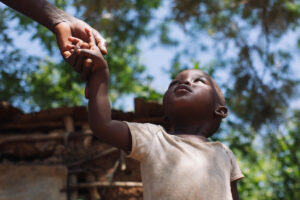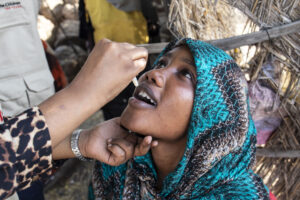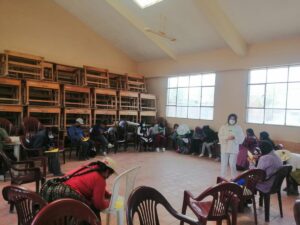It’s World Health Day today. 2024’s theme is “My health, my right”. Every year, we use this day to draw people’s attention to urgent health challenges in the world, and remind world leaders to step up and ensure every child and person worldwide can realise their right to health.
This year, amidst 70 elections worldwide, from the USA to the EU, Uruguay, and Botswana, it’s evident that health is intricately tied to political choices made globally. Whom we elect matters greatly to address half of the world’s population that is still lacking access to basic health services.
The fate of health for all rests in the hands of new leaders. Their decisions will shape collective progress towards universal access to health. What key global health challenges must these new leaders address, and how can they safeguard the right to health for all?

We see a marginalisation of global health on political agendas
When reading the current headlines, global health risks to become marginalised by world leaders. The urgent need to strengthen health systems for global health emergencies remains largely rhetoric. This shortfall hits children the hardest, as they still remain most vulnerable to diseases like pneumonia, diarrhea, or malaria—conditions preventable with vaccines, yet reliant on a robust primary healthcare system for delivery.
Policy-makers seem to have overlooked a crucial lesson from Covid-19: nations with robust primary healthcare systems were far better at ensuring continued access to essential health services for children (and people) while responding to the pandemic.
Global health funding hangs in the balance of key donor elections
The Centre for Global Development states that in 2024, people in 6 out of 10 key donor states will cast their votes, influencing the future of global health funding and hence the health of millions in low and middle income countries. Competing global health replenishments in 2024 and 2025 could exacerbate donor fatigue, diverting essential funds from key global health initiatives. This comes on top of the trend of (further) declining foreign development assistance for health.
Donors are under pressure to balance domestic and international spending priorities, including urgent climate financing, humanitarian aid for crises such as Ukraine and Gaza, and preparing for future migration leaving about 131 million people forcibly displaced or stateless in 2024. Rising public preference for domestic spending over international aid, and media’s short attention spans could further weaken spending for health.

There’s an urgent need to break down silos for sustainable access to health and wellbeing
Social determinants of health such as poverty, housing, education or nutritional security significantly impact people’s and children’s health. Yet, ministries and policy-makers often dispute over resources instead of breaking down siloes. This threatens the sustainability of policies aimed at improving everyone’s health and nutrition, including the most marginalised.
This is very worrisome – especially in times when children from the poorest households are twice as likely to die before their fifth birthday compared to those from wealthier homes. Learn more with Save the Children’s Child Tracker
Civic space for health advocacy is under siege, both locally and globally
When considering present and upcoming elections, it’s evident that people require more than just free and fair polls; they need ample room for civic engagement to advocate for their right to health. Unfortunately, this space is shrinking globally, with 86% of the world’s population living in countries with diminishing civic space.
Similarly, we have long witnessed shrinking civic space to speak out for sexual and reproductive health and rights (SRHR) or gender equality in global multilateral fora. These developments need to be counteracted at all levels. SRHR is a human right and should never be under debate.

On this World Health Day, let’s remember the vital role of political leadership in safeguarding the right to health for all. We need leaders who actively champion global health by:
- Strengthening health systems and maximising available resources
Leaders must prioritize building climate-resilient primary health care systems that can respond to global health emergencies while continuing to deliver quality essential services to all, including children. This requires stepping up global health and nutrition funding, backing initiatives like Gavi, the GFF, the Global Fund, Nutrition for Growth and WHO.
It’s also about aligning policies and funding streams to maximize impact and support national priorities, not creating new funds that fragment the system. At the same time, it’s imperative to find sustainable solutions for the debt of many lower-middle-income nations, allowing countries to increase resources to invest in essential health services as part of Universal Health Coverage.
- Providing political leadership to fight health inequities
Access to healthcare facilities or healthcare workers alone cannot ensure health for all (children). If the bus bringing you to the healthcare facility is too far away, too expensive, or you simply lack the time to go because of your five jobs feeding your family, you will not bring your sick child to the facility.
This is why we require multi-sectoral and whole-of-government strategies which address health holistically. This starts with recognizing that health is a political choice and for leaders to take that choice for people and children globally, no matter whether it can benefit their re-election in a few years or not.
- Ensuring meaningful participation of children and civil society in decision-making
Children’s voices are crucial as they represent our future, and today’s decisions shape their tomorrow. At Save the Children, we not only believe in the power of civil society and children’s voices; it’s the foundation of our work. That’s why we advocate for the active participation of civil society in decision-making, such as through establishing institutionalised spaces as part of the upcoming resolutions on social participation in Universal Health Coverage (UHC) at the World Health Assembly (WHA) in May.
By Marionka Pohl, Global Head of Health Policy and Advocacy, Save the Children – April 7, 2024

